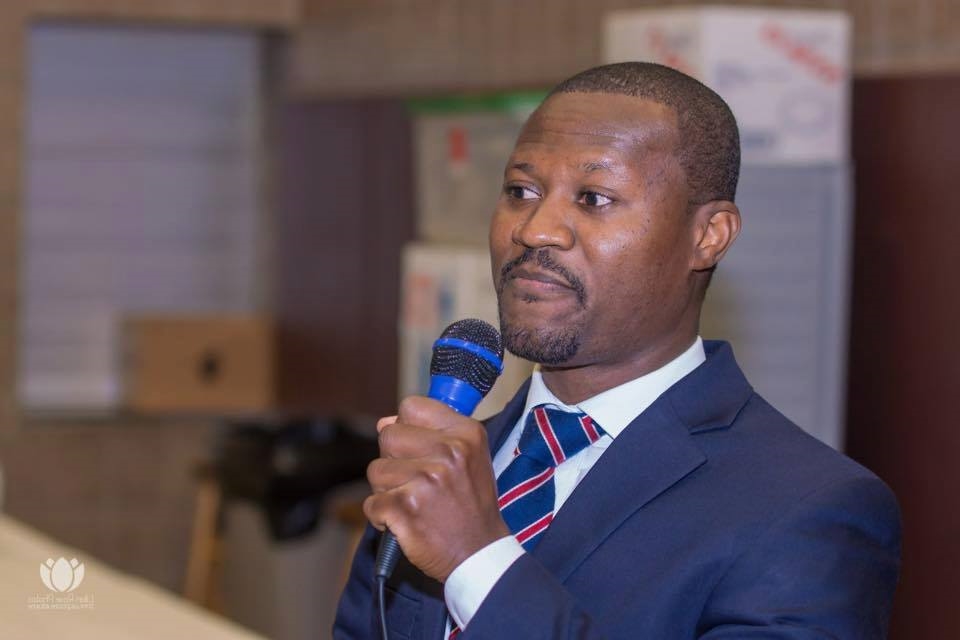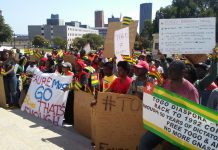More than 500 people gathered at the Brooklyn United Methodist Church in Brooklyn Center on Sunday, December 19 to bid farewell to the late Henry McCabe. It was an emotional day for family members, friends and workmates. The atmosphere in the church was somber, and some relatives cried aloud. Many came from as far away as Ohio, California, Atlanta and other states to pay their final respects.
The story of McCabe’s death is still a mystery. He disappeared on September 7, 2015, Labor Day, and was later found dead in the waters of Rush Lake in New Brighton, about seven miles from Fridley where he was last seen. His relatives and many in the Liberian community still can’t understand how McCabe’s body ended up in the lake.
Since McCabe, 32, died, his family and community members question the autopsy report stating that he died by drowning in fresh waters. “In our darkest moments, where there is the presence of Jesus, there cannot be hatred,” preached Pastor Charles Goah, United Christian Fellowship in Minneapolis at the funeral.
McCabe’s elder brother Timothy Borbor said, “My brother was found in Rush Lake. I believe he was murdered.” It is a suspicion and sentiment shared by many in the Liberian community interviewed by MSR. What really happened to him from the day he went missing to the day he was found dead raises many concerns.
McCabe’s daughter with Kareen McCabe, 10-year-old Yve, asked, “Why did he have to die like this?” adding that it is the “worst punishment ever.” Yve held back her tears as she returned to her seat.
Kareen McCabe shared her memories of meeting Henry in California about 11 years ago. She doesn’t ordinarily give her phone number to men who ask for it, but when she met McCabe at a Liberian party, she did.
“I would normally give out a fake phone number when a guy asks,” recalled Kareen. “But before I knew it, I had given him my real number.” She added that “he taught me how to cook” and in the process she made him “skinnier” as she practiced cooking African food.
For her, Henry McCabe never changed. “He just cares about people’s need. Pushing for paid parental leave, [caring] for those that are oppressed and in need. Material things were nothing to him,” she said in an interview.
Henry McCabe was friendly, and familiar to many Liberians and Africans in Minnesota and California. At work, one of his friends recounted that he even shared his lunch with friends and workmates. He was easygoing, liked politics, and had an open, intellectual mind for understanding local and international issues.
His cousin Saah J.D. Kpakar referred to his writings on his Facebook page, where McCabe tried to address the question of justice. He asked “What is justice?” and how it can be achieved. At his funeral, friends, relatives, and community members promised to seek justice for his death.
In the short time that he worked with the Minnesota Revenue Department, Deputy Commissioner Ryan Church said that McCabe touched many staff members and that the department would always remember McCabe at work.
“It is really striking in that short time the impact Henry had. If you’re greeted by Henry in the morning, you are greeted by an unforgettable smile,” said Commissioner Church, extending condolences to the entire family on behalf of the Revenue Department. “He would cook and share with people around him… People just liked to hang out with Henry. It was Henry’s magnetism that makes him a natural leader,” noting that McCabe rose quickly in leadership roles and how he really cares about people.
“We miss him” continued Church. “To Henry’s mother, to Kareen, to Ivy and to Yve [his daughters], we are sorry for your loss… All I wish for you [is that] your memories of Henry keep you and hold you for always.”
McCabe’s cousin from Atlanta remembered when they landed in California from Ghana, where they spent many years in a refugee camp. McCabe, she told the audience, was seen as a father figure and allocated funds sent to them from relatives abroad appropriately for use at the camp, cautioning them not to spend it excessively.
Many expected the late Minnesota Revenue auditor’s mother, Esater Karmoh, would have been granted a visa to say farewell to her son, but that never happened. From Liberia she sang the last farewell song that brought tears to many in the church.
“I want justice for my husband. He didn’t deserve to die. Someone did this to him. There is a God and he knows what happened and hates an injustice,” said Kareen in tears as the church congregation shook their heads and murmured in unison. “Whoever did this, God will deal with you.”
Henry McCabe is remembered by his two daughters, Yve and Ivy McCabe, wife Kareen McCabe, mother Esater Karmoh in Liberia, family members at home and abroad, many friends, and workmates. He was buried on December 19 at the Mound Cemetery in Brooklyn Center.












































